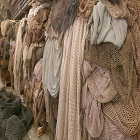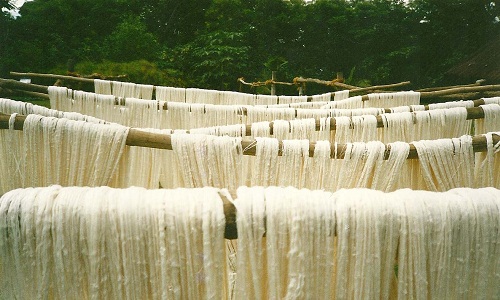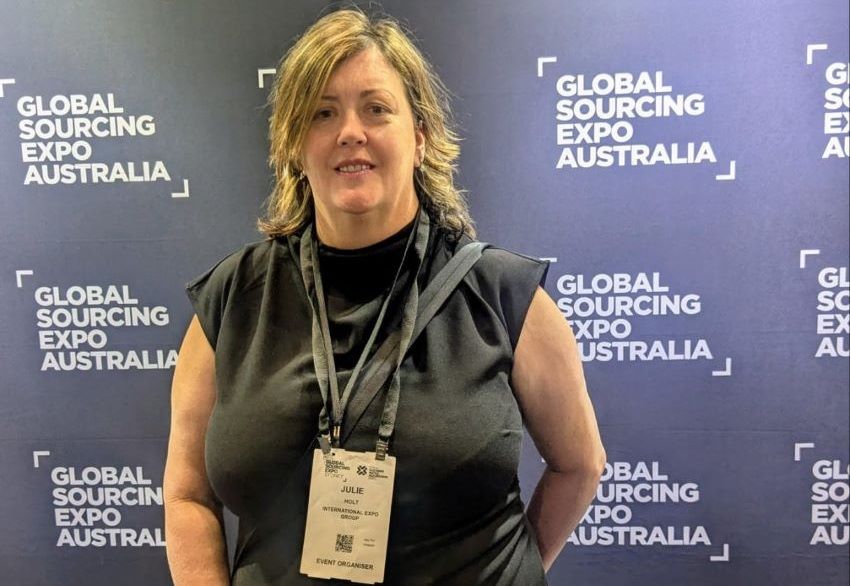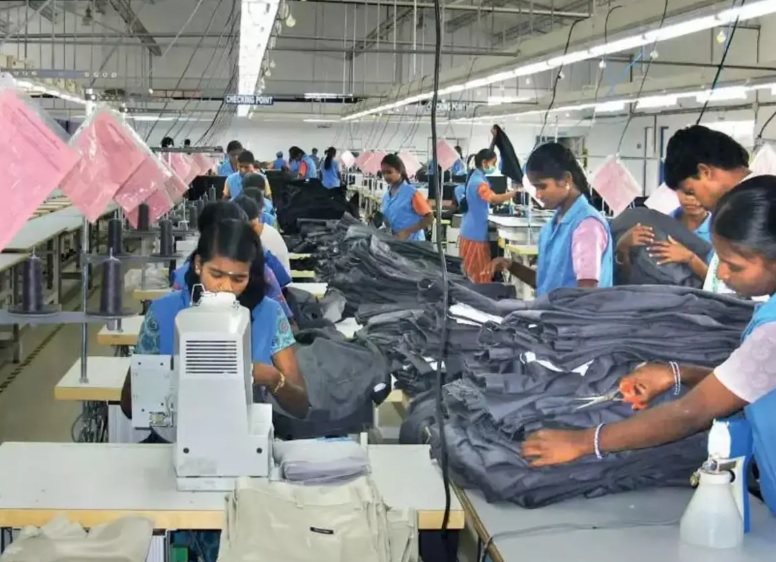FW
The second edition of the Blossom Première Vision was held at the Palais Brongniart Paris on December 13 and 14. The event meant for a preview of the fabric, leather, and accessory Spring Summer 18 collections, ended on a successful note. The event put forward a highly-pertinent response targeting market’s need for exclusives and new, custom proposals.
Over two days, Blossom Première Vision welcomed nearly 700 visitors from the most prestigious fashion and luxury houses, who came to discover and source new product developments and the latest fabric and colour innovations to build their pre-collections. The show dedicated to collection launches saw a positive momentum in line with the expectations of industry players, both exhibitors and visitors alike. This season, the show’s 81 industrial exhibitors went all in on creative novelties, presenting original and cutting-edge collections for spring summer 18.
In addition to the collections presented by 63 weavers and 5 accessories manufacturers, 13 tanners rounded out the offer. Presenting at the show for the first time, this new industry segment attracted the biggest French and international names in luxury leather goods and footwear.
The fashion professionals present voiced their enthusiasm for the show, which, with this 2nd edition, confirmed the coherence and effectiveness of its concept. Aligned with the timing of the pre-collections, the show has already been integrated into the calendars at major fashion houses.
Targeted by the show’s organisers for their high creative and quality positioning, visitors brought together leading French fashion houses (83 per cent of visitors), as well as a growing percentage of leading international brands. International visitors came from Italy (6 per cent), the UK (5 per cent), Germany, Belgium, Spain and the Netherlands.
Astonishingly 70 per cent of the world’s top 240 international retailers like Adidas and Zara among others have European roots. Yet they have built a comprehensive network of stores around the world to match their global fan base, a report of JLL Destination Retail reveals.
Jonathan Bayfield, senior retail research analyst, JLL says that European retailers continue to have a strong presence in the global retail landscape and as more of these brands look internationally to drive sales and diversify, retail expansion is here to stay. In developing markets it’s the fast growing middle classes from Beijing and Jakarta in Asia Pacific, to Dubai and Abu Dhabi in the Middle East, and a number of Latin American capitals that are boosting the growth for European retailers. On the other hand, mature retail markets such as London, Paris, New York and Hong Kong remain prime shopping destinations for increasing number of visitors.
However, with political and economic uncertainties creating waves at home, European retailers need to have the right international growth strategy in place. Adds Bayfield that the uncertain economic outlook and the growth of e-commerce in Western Europe is leading to a growing need for brands to continue to expand internationally in the right locations to achieve balanced sales growth.
The activities of Department of Inspection for Factories and Establishments (DIFE), Bangladesh could not expand its activities to other than the apparel industry due to reasons that include inadequate manpower and logistic support, sources say. The department is yet to begin its activities in full-swing despite necessity even more than two and half years after the up gradation of the state inspection entity, they maintain.
As a result, work place safety and many other issues in different sectors remain unsolved for long. The key objectives of upgrading the Labour Inspection Directorate to a full-fledged department was to make it more effective in dealing with workplace safety and workers' rights.
The necessity of bringing all the industrial units under inspection was considered following a series of industrial accidents especially the fire incidents including a packaging factory at Gazipur, cigarette factory at Ashulia and a chemical factory at Gazipur. Meanwhile, some 161 workers were killed and more than 200 injured in different types of accidents at the ship-breaking yards in Chittagong in last nine years - mainly due to absence of safety measures, industry insiders claimed. Inspections have been conducted only in the readymade garment sector out of more than 45 industrial sectors like jute, ship breaking, sugar, pharmaceutical, chemical, tannery, poultry, hotel, plastic, brick field, tea, bidi and match industry.
Bangladeshi investors are interested to invest in the apparel sector of Ethiopia. This because the country has easily trainable workforce, great climate and facilities like electricity and good road networks, said Bangladeshi ambassador to Ethiopia, M Monirul Islam. Textile and garment companies from the US, China, India and Sri Lanka are also eyeing the textile sector of the African nation.
Swedish government owned development financier Swedfund along with the Bangladeshi conglomerate DBL Group are also establishing a textile factory in Mekelle, Ethiopia, which will provide job opportunities for 4,000 people. This facility is expected to start producing apparel by mid 2017, Islam told the Ethiopian press.
Around 15 textile and garment companies from the US, China, India, Sri Lanka and six local companies are setting up their operations in the park. Once fully operational, the industries within the park will create a total of 60,000 jobs in double shift.
Labour intensive textile and garment industry sector can empower women by offering them financial liberty, observed Islam. He also said that as compared to the traditional jobs which generate minimum income, women can benefit more if they get the opportunity to work in the apparel and textile sector.
Bangladesh’s textile sector employs about 4 million people, 90 per cent of whom are women. He said that women can lead good lives by working in the apparel sector and Ethiopia can learn from Bangladesh about how to empower women.
Bangladesh's planning minister Mustafa Kamal has said that the country’s economy will grow as much as 7.50 per cent in the financial year 2016/17 that ends in June this would be slightly faster than the initial target. He said that his government was hopeful of achieving this growth.
Growth in Bangladesh spiraled 7.11 per cent last fiscal compared to 6.5 per cent in the previous year when political unrest had crippled the economy. Garment exports and remittances from Bangladeshis working overseas are said to be the key drivers of the nation's more than $200 billion economy.
For the first time ever, Bangladesh will dislodge China as the largest importer of Indian cotton and cotton products such as yarn and fabric in this fiscal, it has been reported. According to official data, India’s exports of cotton to China dropped to a total of just $416.14 million in the first half of the current fiscal while that to Bangladesh touched $613.16 million in the same period.
With demand from China remaining subdued, India’s exports of such items to the nation are unlikely to rebound anytime soon, it is said. As early as 2011-12, China’s purchases of cotton and cotton products from India were almost four times that of Bangladesh’s. As a matter of fact, cotton and cotton products remained India’s largest segment of export items to China for years accounting for 19-26 per cent of the country’s total supplies to the bigger neighbour until recently.
In the first half of this fiscal, though, such items made up for a meager 10.5 per cent of the country’s overall goods exports to China. The slowdown has been driven by China’s offloading of massive official stocks to consuming industries and a discernible withdrawal from labour-intensive sectors such as textiles and garments due to soaring costs, it is understood.
With units operating at 20-30 per cent of their installed capacity with the shortage of cash hurting operations, Demonetisation has thrown the ginning industry out of gear. Ginning clusters in north Gujarat and Saurashtra have expressed concerns over the prolonged slackness in ginning activity due to shortage of cash at banks in the smaller towns and limited penetration of banking among the workers, mainly in Saurashtra that houses nearly 600 ginning units.
Since November 8, the ginning activity has been low as arrivals have also dried. Now that the arrivals have improved, processing has remained low due to shortage of liquidity in the market. Cotton arrivals in the market is reported at about 20,500 bales (of 170 kg each) at Rajkot with prices quoting in the range of 980-1,067 per maund of 20 kg. The arrivals are almost at par with what was witnessed in the same period last year.
According to factory owners, the farmers have started accepting cheques but the operational issues such as clearing time for a nationalised bank cheque into a cooperative bank takes longer time, thereby hurting farmers preference to use the instrument for the transaction. Avers Anand Popat of Saurashtra Ginners Association that the banks should either issue instruments such as bankers cheque or travellers cheque without additional cost so that money transfer becomes quick and easy. Ginners are clueless what will happen after December 30. Hence they are maintaining a wait-and-watch approach. Trade sources maintained that raw cotton prices have touched 5,000 a quintal, while processed cotton prices hover at around 38,200-900 a candy (of 356 kg each).
Los Angeles-based fashion brand American Apparel has closed all but one of its 13 UK stores. The move resulted in a loss of 150 jobs. The brand, known for hot pants and slinky leggings, put its UK business into administration last month just before the troubled parent company struck a deal with Canadian T-shirt maker Gildan Active wear that will take over all the closed stores.
It is heard that Gildan bought the worldwide rights of the American Apparel brand for $66m (£54m). American Apparel has also filed for bankruptcy and the retailer has begun winding up its businesses in Spain, Japan and Australia as part of the deal with Gildan, which is expected to be finalised early next year. The only Irish store closed a few weeks ago.
As many as twenty three textile companies from Bangladesh are gearing up to exhibit their products at Heimtextil, the international trade fair for home, towel and contract textiles, to be held in Frankfurt from January 10 to 13, it is understood.
Of the 23 companies, 10 firms would take part in the exhibition under the arrangement of the Export Promotion Bureau while the rest would participate directly. The companies include ACS Textiles (Bangladesh) Limited, Apex Weaving and Finishing Mills Ltd, Mom Tex Limited, Noman Terry Towel Mills Limited, Regent Textile Mills Pvt Ltd, Shabab Fabrics Ltd, Towel Tex Limited, Unilliance Textiles Ltd, Shamsuddin Towels, Hossain Dyeing, Zaber & Zubair Fabrics Limited, Anik Composite Mills Ltd, Instinct Textile Ltd, Miray Towel Industries Limited, Virgin Grace Ltd, Jaantex Industries Ltd, Manuri Textile Mills, RTT Textile Industries Pvt Ltd, Eke Tex(Pvt) Ltd and Asix and RTT Textile Industries (Pvt) Ltd. Organisers informed that more than 2,886 exhibitors from 69 countries would take part at Heimtextil.
"With growing focus on the 3Rs – Reduce, Reuse, Recycle, textile companies are finding ways and means to recycle fabrics. The key to the new generation of recycled synthetics is they are becoming as good in performance and function as their virgin counterparts. Cordura EcoMade, made from recycled polyester, is a case in point, with Cordura renowed for its high tenacity, the recycled alternative is specifically engineered to meet the fabric performance and durability specifications of the Cordura brand."

With growing focus on the 3Rs – Reduce, Reuse, Recycle, textile companies are finding ways and means to recycle fabrics. The key to the new generation of recycled synthetics is they are becoming as good in performance and function as their virgin counterparts. Cordura EcoMade, made from recycled polyester, is a case in point, with Cordura renowed for its high tenacity, the recycled alternative is specifically engineered to meet the fabric performance and durability specifications of the Cordura brand. Plain, dobby and rip stop weaves based on 600 denier yarn count can be incorporated, working perfectly for day packs. The process to produce Cordura EcoMade fabric reduces energy consumption and extends the use of the polyester.
Success stories

Patagonia has been diverting resources from the landfill since 1993 when they made the first fleece from recycled plastic bottles. Today they are using more recycled materials in their collection without sacrificing performance or quality. This season witnessed the launch of the recollection – styles made with all sorts of recycled materials, including 100 per cent recycled down, 100 per cent recycled wool and 100 per cent recycled polyester with 85 per cent recycled polyester labels, 80 per cent recycled zippers and 50 per cent recycled buttons. This is radically resourceful clothing, built to keep you warm, and they are ready to be recycled again when the time comes.
Take-Back-Systems – retailers taking responsibility
In another first, Patagonia is offering a worn wear repair service to its products, ensuring a longer life cycle to the consumer. Additionally, it is one of the brands to offer a take-back system for unwanted clothes and footwear, with more retailers pushing this closed-loop philosophy, reducing landfill of unwanted garments. But what happens when you take your old kit to the store, where does it go and how is it processed? I:Collect, part of the Soex Group, is an international provider for collection, reuse and recycling solutions for clothing and show, with national subsidiaries in Germany, the United Kingdom, Japan and the United States. Its take-back system and worldwide partner network, the company is able to both directly reuse clothing and pre-process the key ingredients before returning them to different production cycles.
The I:CO take-back system offers the retail industry the capability of assuming product responsibility by companies taking back clothing and shoes directly at their points of sale for reuse and recycling purposes. Consumers in more than 65 countries can deposit clothing and shoes conveniently at one of the many I:CO trading partners. In return, they receive a voucher for their next purchase. All the collected items are transported to sorting and recycling centers where every piece of clothing is sorted by hand and categorized for its best possible use.
Clothing that can still be worn, which account for up to 60 per cent of the total returns is preserved and sold according to quality aspects. The remaining 40 per cent is stripped and processed into different end products from recycled yarns, in particular garments wool and cotton, through to insulation materials. Buttons and hard materials retrieved from the shredding of garments are sorted out for use in the metalworking industry.
Full circle natural fibers
Filatures du Parc has developed a new yarn made from recyclable and recycled fibers with the patented manufacturing system. The recycled fibres are made from post-consumer jeans, collected through European partners. The jeans are selected and sorted on shades, like clear, medium and dark jeans. Filatures du Parc transforms the jeans fabrics into fibers and blends them with PET, which is recycled fiber polyester from plastic bottles.
The commonly used shredding system for fibre-recycling damages and shortens the fibers. As a result, the pilling quality is bad. The new fiber recycling process maintains fiber length which results in good quality yarns. Consequently, this new type of yarn has the same characteristics – sometimes even better – as yarn made from original fibres, particularly when it comes to breaking strength, elongation, abrasion, pilling and colour fastness.
Saving on natural resources
Synthetic and cellulosic fibers require large amounts of water and energy in the production process. This has a big impact on the environment. In the contrary, recycled fibers reduce the environmental impact of the production process. The patented yarn spinning process of Filatures du Parc also reduces dye pollution. Tessile Fiorentina has created a technical wool collection made out of reclaimed wool garments. Based in Prato, Italy, the company collects garments that they shred and spin into a recycled wool fiber. By sorting into colours prior to spinning, the recycled fibre does not need to be dyed, thereby saving water. It also offers the flexibility to play with different colours in one yarn to create something unique. The performance collection is woven in 100 per cent wool fabrics or blended with synthetics for added performance.












